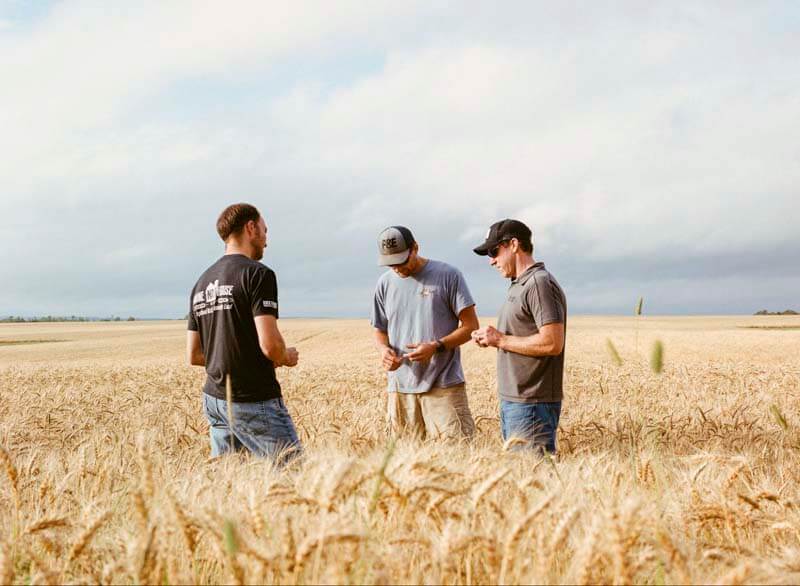
New Belgium believes that if more isn’t done to combat climate change beer will start to taste different due to the effects of warming global temperatures on hops.
To demonstrate what beer could taste like in the future, New Belgium Brewing Company, the fourth largest craft brewery in the U.S, released a beer on Earth Day 2021 called “Torched Earth Ale.”
Brewed with smoke-tainted water, dandelions, and drought-resistant grains, the beer included ingredients New Belgium hypothesized brewers would have access to if climate health continues to deteriorate.
Researchers forecast that global beer consumption will decrease by sixteen percent during extreme climate conditions such as heat waves and droughts. That’s equal to about as much as the United States drank in 2011!
The erratic and unpredictable weather patterns caused by climate change put the quality and yield of hops and barley crops at risk.
For example, periods of drought can lead to lower crop yields, increase prices for farmers, and provide less opportunity to innovate with new hop varieties in beer recipes.
By investing in sustainability, your brewery can make a positive impact on the environment. Beyond that, supporting environmentally friendly practices can appease a socially conscious consumer base, elevating your brand.
And good news. You don’t need to be a huge brewery to make a difference. Both big and small breweries can invest in sustainable methods on a local or national level, or with small or big acts.
For instance, two of the nation’s most well-respected breweries, Allagash Brewing Company and New Belgium Brewing Company, have successfully implemented sustainable practices that reduce water usage, focus on local grains, recycle materials in the brewery, and more.
Luckily, they shared their tips and tricks with us.
(Photo above: Allagash brewers tour a wheat farm in Maine. Photo Courtesy of Allagash Brewing Company)
Affordable, Industry-Leading Brewery Software
Why Your Brewery Should Care About Being Green

Solar panel roof installation at Fort Collins location as part of New Belgium’s sustainability efforts. When fully charged the energy from these panels can power the canning and bottling lines. Photo Courtesy of New Belgium Brewing Company
First and foremost, being a sustainable brewery has a direct impact on the environment.
Katie Wallace, Director of Social and Environmental Impact at New Belgium, says sustainability has been ingrained in their brewery since its inception in 1991.
According to Wallace, the company’s founders have always had a passion for craft beer, environmental awareness, and sustainable business practices, making New Belgium one of the most climate-conscious breweries in the country.
“We emphasize producing beers of the highest quality, as well as fostering beer culture and environmental responsibility,” says Wallace. “Along the way, we discovered that it was economical and energy efficient to practice sustainable brewing… Our goal is always to drive systemic change where possible for a bigger win.”
For instance, New Belgium recently announced they are committing to becoming carbon neutral by 2030.
Likewise, Brett Willis, senior communication specialist at Allagash Brewing Company, explains that when you’re focused on more sustainable brewing, you’re going to inherently have a higher quality level because you’re paying attention to the details.
“As I’ve seen Allagash be more sustainable…it feels like the quality of our beer continues to climb because we’re researching and we’re thinking about it,” says Willis. “With more sustainability comes literally better beer.”
And in the long run, better revenue.
Willis describes how fortunate Allagash has been that each environmental initiative the brewery has undertaken, from composting to reducing water usage, has saved them money.
“Yes, there is a cost associated with the organization of figuring it out and spending people’s time to figure out what is the right way to do this rather than what’s the easiest way to do this,” Willis says. “[But] it’s been really good in the long run for us from an efficiency and spending perspective.”
Overall, being green is more than just a feel-good endeavor. A strong commitment to being green helps your brewery differentiate itself from competitors, brew better beer, save money in the long run, and build brand loyalty.
Four Ways Allagash Makes Its Brewery More Sustainable at the Local Level

LEFT: Maine grain delivery. RIGHT: Allagash White—their award-winning interpretation of a Belgian-style wheat beer. Photo courtesy of Allagash Brewing Company
Allagash’s sustainable practices are community focused with the ethos that if you show enthusiasm in your neighborhood, you make it easier to see visible change.
For example, the brewery donates one percent of all revenue to local community organizations, giving over $600,000 in contributions by year’s end.
With more of a local approach, Allagash proves that you don’t always have to go big to go green. That you can have a big environmental impact even if it’s just in your own neck of the woods.
1. Become a Certified B Corp
Becoming B Corp Certified is a legal designation that indicates that a company is adhering to strict accountability and transparency criteria in areas such as charitable giving, input materials, and supply chain processes.
“What it means to be [a] Certified B Corp is that you have a legal framework which says when you do your business you’re not just doing your business for the bottom line or the shareholders, you’re making decisions based on the well-being of your community, employees, and environment,” says Willis.
It’s meant to be a difficult process, truly making you prove that you deserve to be B Corp Certified.
“For the B Corp Certification you do this whole long survey of all the things you’re doing in your business,” explains Willis, noting that the survey will generate a score.
A score above 80 qualifies you as a Certified B Corp.
Willis goes on to say that every three years you’re required to apply for recertification. This allows you to continue making improvements around your brewery, thinking about more ways your business can make a difference when it’s time to reapply.
To demonstrate their commitment to their community and environment, in 2016 Allagash set a goal to brew with one million pounds of Maine grain annually by 2021, hitting that mark last year.
As a side note—track your numbers!
If you want to see how applying green initiatives has benefited your business—and continue to raise your Certified B Corp score—you can’t know if you’re doing better or worse if no one is keeping track!

LEFT: Sorting materials as part of Allagash’s Recycling Co-Op. RIGHT: Allagash’s Green Team recycling bins and sidestream recycling items. Photo courtesy of Allagash Brewing Company
2. Create a Green Team
How can you expect to start new sustainability practices without someone leading the charge? At Allagash, the brewery has a Green Team made up of people from around the brewery who are all sustainability minded.
Since 2007, the Green Team’s objective is to hold Allagash accountable for continually coming up with new ways to reduce or recycle waste throughout the brewery while also providing employees with a means to assist in recycling efforts.
These can range from things like finding alternatives for paper towels, reducing paper use, or even exploring timed overhead lighting so you don’t have to worry about forgetting to shut off the lights.
Willis suggests, if anyone is looking to establish their own Green Team, open the invitation to employees from every department across the brewery from production to marketing.
“Breweries have a ton of different functions,” explains Willis. “By having buy-in from everyone or representatives from every part of the company, you’re more likely to have things actually happen.”
Even if you can’t start your own recycling program, Willis shares that it’s also worth exploring the idea of sidestreaming waste. Rather than trying to just recycle something, find a way to reuse it.
For example, if you find that your brewery has a surplus of spent grain, compost it or donate it to a local farm as livestock feed.
Interested in recycling your spent grain? Check out our guide to The 4 Best Ways Professional Brewers Are Recycling Spent Grain.
3. Start a Recycling Co-Op
One of Allagash’s most successful local initiatives has been starting a Recycling Co-Op.
The brewery reports that nearly 99.8% of their waste is able to be recycled or sidestreamed. The Recycling Co-Op aims to take care of the remaining .2% percent.
Local breweries bring their hard-to-recycle items to Allagash’s warehouse, where they are stored until enough is gathered to transport them to a recycling center.
“In brewing, there are some materials that are easy to be recycled like cans, bottles, and cardboard, but there are other materials that you get a lot of that are not as easy to recycle—that you can’t just chuck in the single-sort recycling—like stretch wrap or grain bags,” says Willis. “If you can get enough of this stuff together, then you can recycle it.”
The Recycling Co-Op has been part of the brewery’s sustainability efforts for the past two years. With participation from Maine Beer Company, Bissell Brothers Brewing, and Foundation Brewing Co.
“The idea was…to open the invitation to other breweries and businesses that are in the same realm to bring their stuff to us so that we can put it all together and ship it off to be recycled rather than disposing of it separately,” explains Willis.
By the end of 2022, Allagash’s Recycling Co-Op will have recycled more than forty tons of material!
4. Reduce Water Use However You Can
Brewing beer is an energy- and water-intensive process.
Typically, beer includes up to ninety to ninety-five percent water with a one-gallon batch of beer requiring, on average, seven gallons of water to make.
But Allagash has found a way to significantly cut back on its water usage.
“We recently achieved an average of 3.1 gallons of water per gallon of beer, down from our previous low of 3.8 gallons of water,” says Willis.
Willis says Allagash hit that mark through a variety of different practices.
“In one case, we started routing the water that we use to rinse the inside of our bottles before filling to also then be piped over to rinse the outside once they’re filled,” explains Willis.
Allagash also believes that part of the answer is brewing beer intentionally.
“Our brew system is highly efficient, which saves water, and we’re recapturing water through the steam from the brewing process for other uses,” says Willis. “We’re also just very deliberate in our processes across the board to minimize mistakes.”
Additionally, Allagash takes great care to respect its water supply, Sebago Lake. It’s one of the fifty cleanest groundwater sources in America, and it’s also the source of water for one in six Mainers.
The brewery committed to giving back for every barrel of beer produced. Last year Allagash donated more than $12,000 to Sebago Clean Waters to support efforts that help to continue preserving the Sebago Lake’s water quality for all.
Three Ways New Belgium Makes Its Brewery More Sustainable at the National Level
New Belgium has supported sustainable incentives and regulations for the brewing industry for more than three decades, advocating for other breweries to produce beer in a more environmentally friendly manner.
In a significant effort to reduce its greenhouse gas emissions, New Belgium has brewed the country’s first carbon-neutral beer, implemented solar panels, produced power from process effluent, and captured and recycled the heat generated during the brewing process.

New Belgium’s Fort Collins, Colorado, location. Photo Courtesy of New Belgium Brewing Company
And, like Allagash’s Green Team and Recycling Co-Op, New Belgium created its own internal group called the Brewers Association Sustainability Subcommittee and a program called the Glass Recycling Coalition.
Beyond their own carbon neutral initiatives, New Belgium has advocated for climate policies at the legislative level and even released a comprehensive blueprint for the beer industry to replicate.
All with the goal to help other brewers take action at a national level.
“We’re strong believers that any true success in limiting warming to 1.5-degree C will require working collectively across our communities, our states, our country, and even globally to drive speedier and more cost-effective solutions at scale,” wrote Wallace in an email to Ollie.
Wallace mentioned three programs in particular.
Advocate for Climate Policies at the Legislative Level
If you’re truly looking to make a greater impact, you can join national organizations fighting for sustainability, talk with your local brewers guild about environmental practices, or even speak directly with your local lawmakers.
“More brewers engaging in advocacy is one of craft beer’s best bets for protecting our industry from climate threats already happening,” says Wallace. “Talk to your local Brewers Guild about sustainable efforts and if they don’t seem to be prioritizing it, don’t let that stop you from having a direct conversation with local officials about it.”
New Belgium did. They’re one of more than forty participants in the Business for Innovative Climate and Energy Policy (BICEP), a coalition of businesses whose primary goal is to call on the U.S. government to pass broad, bi-partisan energy and climate legislation.
It’s just one way they’re advocating for sustainability at a national level.
“While we initially committed to environmental stewardship in 1991 because we knew it was the right thing to do,” says Wallace. “We’ve since come to understand, very specifically, the business case for climate action at a national and global scale.”
Wallace goes on to explain how the cost of mitigation today is far less than the cost of attempted adaptation if climate change is left untended.
“You’re starting to see the tangible numbers come out of shareholder disclosures—an analysis framework that companies follow to communicate to shareholders the cost to their share value at varying levels of warming,” says Wallace. “The cost is significant.”
Which is why breweries can’t be afraid to get loud! Wallace encourages breweries to be enthusiastic and to speak up in favor of group actions that will lead to long-term sustainability efforts.
“You have a big voice as a local business owner, and letting those folks know how collective action would help not only your business but others in the community can go a long way,” says Wallace.

LEFT: This storage bubble allows New Belgium to collect methane. RIGHT: Fat Tire Amber Ale, the nation’s first certified carbon-neutral beer. Photo Courtesy of New Belgium Brewing Company
Invest in Wind Power and Other Renewable Energy Sources
Every brewery nationwide is a massive consumer of natural resources, electricity, and water.
To reduce its national carbon footprint, New Belgium, who like Allagash is also a Certified B Corporation, implemented green alternatives to brewing.
For one, they reassessed their energy sources.
In 1998, New Belgium workers unanimously voted to donate their profit shares to fund grid-level wind power in Fort Collins for the first time.
“At that time, we were able to claim ‘100% wind-powered electricity,’” says Wallace.
Since then, New Belgium has adopted other renewable resources.
Today, a dedicated team works closely with all departments to prioritize expenditure of this money on internal efficiency and renewable energy projects over time.
“The way our Utility structured their renewable energy program over time, our continued investments in local wind weren’t driving change on our local grid for a while,” says Wallace.
Though it looks different today, through their experience New Belgium’s found a way to fund renewable energy for their brewery using an internal energy tax.
“During that time, we stopped paying into the Utility wind program, and we brought those dollars (which were substantive) into an internal energy tax program,” explains Wallace. “Based on the amount of energy we bought annually, we’d tax ourselves and put it into a fund dedicated to lowering our environmental impact—things like solar panels and increased efficiency investments throughout our operations.”
And New Belgium’s sustainability efforts only continue to grow!
“At this time, we have a strong mix of onsite renewables (biogas, solar, solar thermal) and grid renewables, all working to RE100 by 2030 and SBTI absolute carbon reductions by 2030,” says Wallace.
New Belgium has urged municipal and local decision-makers to commit to 100% electricity by 2030 on local grids.
Download New Belgium’s Own Sustainability Handbook
As the makers of Fat Tire Amber Ale, the nation’s first certified carbon-neutral beer, New Belgium has learned a thing or two along the way about sustainability.
With all the effort they put into becoming carbon neutral, New Belgium has created its own thorough guide called the Carbon Neutral Toolkit for Craft Breweries; any brewery across the country can download the toolkit right now.
It includes resources and guides on everything from policy advocacy to calculating carbon emissions.
“The policy advocacy section within our toolkit gives some starter tips for how to reach out to elected officials and what to talk about (mainly their business case for what they’re requesting vs. directly adopting talking points from activist organizations),” explains Wallace.
Wallace encourages breweries to download New Belgium’s carbon toolkit no matter the size of your brewery because there are plenty of small (and big) ways to make an impact.
“Tiny breweries may feel they can’t afford energy efficiency investments,” explains Wallace. “You’d be surprised by some of the simple and immediate solutions available.”
And if you’re just looking for a good place to start, it makes sense to follow in the (carbon neutral) footsteps of one of the most environmentally friendly breweries on earth.
Because it’s only together that we can understand our impact on the environment and take steps toward carbon neutrality.
Brewing Beer Is Technical – Ollie Makes It Consistent
As a brewer, you’re very deliberate about your standards of procedure. Ollie makes it easy to incorporate your recipes so that your brewers know how to brew the best batch every time—ultimately reducing your beer loss but raising your production profits.
As if Ollie couldn’t possibly make brewing beer more efficient, with Ollie’s unique raw material forecasting technology, you’ll receive real-time notifications when your inventory levels are running low so that you can be on top of any issues at all times. Request a free demo today.



